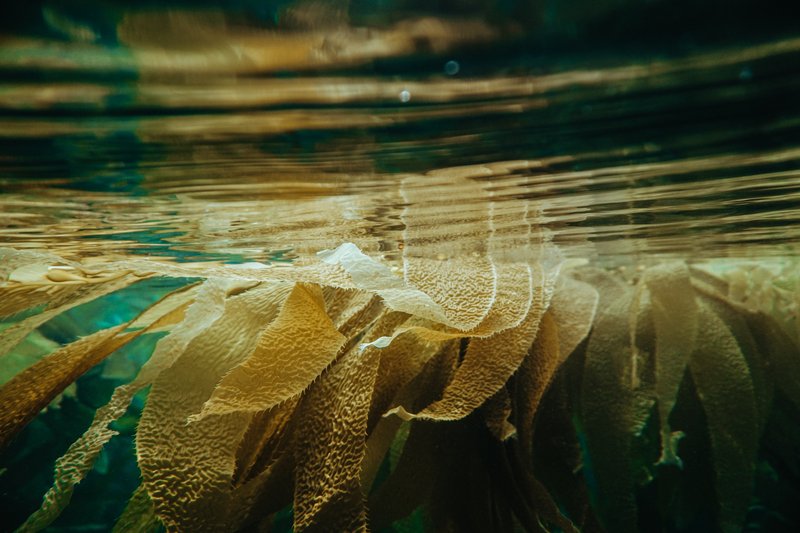How Oceanium are tackling the climate crisis with sustainable seaweed
Alex Harbinson is an October 2020 Associate who completed her first placement at Oceanium.

My journey to On Purpose was a fairly lengthy one. I studied graphic design and worked both agency and client side before transitioning into marketing. I was working at Unilever South Africa, Italy and London, and then began developing behaviour change campaigns within the energy space. However, I really wanted to have a bigger social and environmental impact in the work that I was doing. Deciding that is one thing, but then determining what to do next was far more challenging. I looked at completing a masters in sustainability, but soon realised that I wanted something more ‘hands on’. I had some career coaching, and I spoke to lots of people in the impact sector, and that’s how I found out about On Purpose. The programme felt like it had been bespoke designed just for me, as it ticked every one of my ‘boxes’. It was quite scary taking the plunge; and giving up the safety and security of my job. Conversely, it also felt deeply liberating and exciting – taking control to move my career in the direction which I wanted.
I’m just coming to the end of my first six-month placement, which is at a bio refinery start up called Oceanium. The business makes products from sustainably farmed seaweed - home compostable packaging, as well as food and nutrition products. Seaweed is pretty amazing, as it absorbs CO2 and nitrogen; helping to mitigate climate change and reducing ocean acidification. Unlike crops such as soya or maize, seaweed does not require cleared land, pesticide or fresh water. The practice of seaweed farming creates a marine reserve area, as it protects against commercial fishing. Oceanium intends to enable this nascent industry in the western hemisphere, which will create many jobs both in both seaweed farming and processing.
One of the joys of working at a startup is that you get to wear many ‘hats’, which really appealed to me, after years of working in very specialised roles. I report directly into the Oceanium CEO, the very impressive Karen Scofield-Seal, which means that the work I do always receives the highest levels of visibility. It’s been great to have such varied exposure and experience, and to try new things. I’ve covered a lot of ground in a short period of time, so I’ll just touch on a few of the highlights.
I’ve spent a fair amount of time developing a commercialisation strategy for the Oceanium nutraceutical products which will go to market at the end of this year. This work has been really interesting, as there are so many different potential business models for products of this nature – and the response has been overwhelmingly positive. Oceanium has received special recognition from the World Economic Forum (WEF). I’ve been working closely with the WEF team to develop some co-branded collateral, and it’s been very satisfying to see the reach and engagement these assets have had. Oceanium is an impact led business committed to contributing to the achievement of the United Nations Sustainable Development Goals (SDGs).
I’ve also had the opportunity to work on the organization's overall impact strategy, as well as project managing the delivery of the impact assessment for one of the company’s Innovate UK grants. I’ve also been introduced to the wonderful, sometimes confusing world of Life Cycle Analyses, which measure the impact of a product from its inception, until its end of life.
This blog post forms part of a feature on sustainable food systems, which is an issue very close to my heart. Europe is already importing 70% of its protein, and the world will require 50-70% more food by 2050 (despite an increase in drought conditions and soil erosion globally). A massive step change is urgently needed to ensure food security both now and in the future.
Seaweed is exceptionally nutritious, it contains vitamins, minerals and protein essential micronutrients. It is also one of the few vegetable sources of vitamin B-12 (which as a follower of a plant based diet, is music to my ears). Seaweed is one of the fastest growing organisms on earth. In fact, giant kelp has been known to grow up to 60cm in a single day; despite the fact that it is not resource intensive like more conventional crops. It is also very hardy, able to withstand freezing cold waters, scalding beaches and very rough currents. Oceanium is producing both protein and nutritional fibre products made from seaweed.
Seaweed protein can replace meat; but is also a more sustainable alternative to soya or pea protein. Seaweed fibre can be used both as a gelling and a texturising agent, with binding properties which make it ideal for vegan dairy and meat alternatives. And this is just the tip of the iceberg… As more and more work takes place in the seaweed space, new benefits it can offer our food system keep coming to light. For example, farmers are finding that by adding seaweed to the diets of their cows rapidly reduces methane their greenhouse gas emissions. In a nutshell, seaweed will play a key part in making our food systems more equitable and more sustainable, and it’s been a really exhilarating to play a part in this transformation work.
Photo by Shane Stagner on Unsplash
